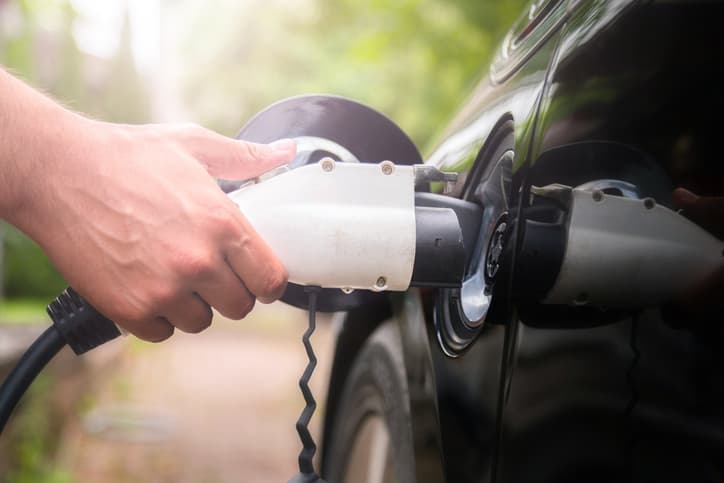Charging Your New Electric Car
Easy Ways To Charge Up

Electric vehicles (EVs) are becoming more popular in Ireland. With climate change firmly on the agenda, the technological innovation and development of electric vehicles more advanced than ever before, and national infrastructure gradually adapting for their mainstream use, this should really come as no surprise.
However, electric cars can take some getting used to, especially if you have driven a fossil fuel-powered vehicle for years. This is because, while they resemble and drive like traditional vehicles in almost all respects, learning how battery-powered vehicles operate and how to charge them may take some getting used to.
So, whether you’re new to electric vehicles or a seasoned green motorist, it’s important to ensure you are as clued up as possible when it comes to charging your new electric car. To help you out, here at Chill we’ve put together the following guide to tell you everything you need to know about charging EVs.
How Does Charging A Car Battery Work?
In many ways, charging an EV’s battery is similar to charging any other electrical device which uses a rechargeable battery, such as your mobile phone, electric toothbrush or digital camera. It is typically done using a single connector that safely transports mains electricity into the battery to be stored. However, where charging a car battery starts to differ from other rechargeable items is when you look at the various different methods of charging. From home charging, on-street charging and service station charging to slow, rapid and fast charging options, there is a lot of variety when it comes to powering your EV.
Naturally, all methods of charging achieve the same thing - the charging unit of your choice converts AC electricity from the mains network into DC power that can be stored in your electric car’s battery. Whether you are using a slow home charger or a rapid on-street unit, these clever sources of power also control the voltage level in the battery’s cells by constantly adjusting the rate of charge, while also monitoring and adjusting temperatures to ensure the battery is not damaged in the process.
What Do You Need To Charge An Electric Car?
What you need to charge your electric car depends on where and how fast you want to do it. As discussed above, there are a number of ways you can charge your EV, both at home and when you are out and about. Here is what you’ll need for the most common methods:
Charging At Home
You have a number of options when it comes to charging at home. The most simple method is to literally charge your EV by plugging it into a standard socket outlet. While this may sound oversimplified, you really can do this. All you need is the approved cable that fits your specific make and model of EV that takes power from the mains using a standard three-pin plug and gives it directly to your car’s battery. Although simple to get started, this method is the slowest charging option available.
Another method of home charging involves installing a dedicated charging point. These units can be bought from your car dealership, or from independent electric car specialists, and are much faster than standard socket charging. Thanks to the Electric Vehicle Home Charger Grant, you can even claim up to €600 to put towards the purchase and installation of a home EV charging unit.
Public Charging
Aside from home charging, it is also becoming increasingly more simple to charge your EV on the go, with public charging points located across Ireland. The most common locations include motorway service stations, supermarket car parks and shopping centres.
These public charging points typically include tethered charging cables, particularly the fast and rapid charging units. However, it is always a good idea to keep your own cable in your boot in case you need it. It is also important to remember your wallet or purse to ensure you can always pay for the electricity you use.
How Much Is A Home Car Charging Station?
The price of home car charging stations varies depending on the brand of unit you opt for and its charging capabilities. However, the most common and practical home charging stations cost around about €1,000, fully installed. Indeed, Electric Ireland currently offer their standard 7kW EV home charger, fully installed, for €1099. And remember, if you also apply for the Electric Vehicle Home Charger Grant, you could see €600 knocked off this price.
Do You Have To Pay For Electric Car Charging?
Paying for the electricity needed to charge your car is simple. When you are charging at home, as you will be using your property’s mains electricity, charges will simply be added to your normal electricity bill that will be provided by your electricity supplier.
When it comes to public charging points, there are various different providers who manage and maintain public charging stations across Ireland. These include ESB Ecars, EasyGo, Circle K and Applegreen. Nearly all of these companies provide both subscription (prepaid card/app) payment options, as well as pay-as-you-go options at the station. This means keeping your EV topped up on the go is simple.
How Much Does It Cost To Charge An Electric Car?
While the cost of charging an electric car clearly depends on the make and model of the EV in question, the size of battery it has, the speed of charging station you are using and, if you are using a public station, the company that manages that unit, in Ireland it costs an average of 24c per kWh. This means it costs around €15 in total to charge an EV battery from flat to full, working out at around €5 for every 100km travelled.
We hope you found this blog interesting. You might be interested in reading other Electric car related posts:
